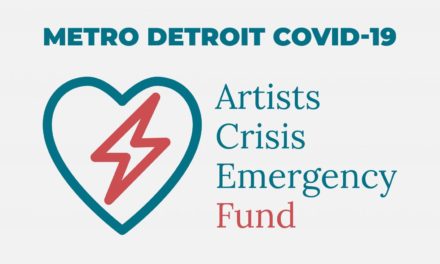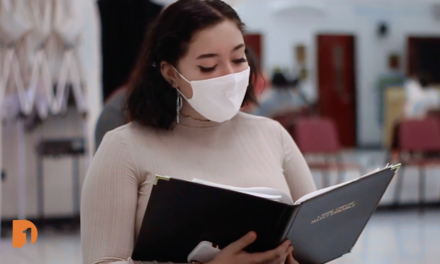Does Governor Whitmer have any plans to ease restrictions before May 1st?
Gov. Whitmer spoke with One Detroit’s Christy McDonald about the important factors at play when it comes to re-opening Michigan, the state’s needs when it comes to testing supplies, as well as budget concerns.
Read the full transcript:
Gov. Whitmer:
We have to look at the two crises that we’re confronting. One is a health crisis. The health crisis precipitated an economic crisis. So we know that until we actually address the health crisis in a meaningful way, our economy will never be um, the, as strong as it was-
Christy McDonald:
Governor Whitmer it’s good to see you today. How’s everything going?
Gov. Whitmer:
Thank you. Well, I’m hanging in there, you know, we have, um, there are small science to give us hope and to know that the stay home order is working. Vast majority of people are doing their part and so I’m grateful for that and I’m hopeful that we can continue on the same trajectory and- and think about, you know, what- what safe practices look like in the next step.
Christy McDonald:
All right, so we see the- the number of positive tests are starting to fall and come down. Everyone is looking towards this- this May 1st date. Are there any plans to ease restrictions before May 1st?
Gov. Whitmer:
Well, you know, we are looking at the data every single day and we’re gonna continue to do that for- for the weeks and- and months ahead because what we know is that COVID-19 will continue to be present in some form. The- the goal is to keep it at a manageable number, to keep the fewest people from, you know, getting it as possible to reengage in a thoughtful manner, certain sectors of our economy. And so I can’t, uh, 10 days ago I couldn’t have predicted that we would see this leveling off. 10 days from now I can’t predict precisely what we will see in the, in the interim, but I do know if everyone continues to do their part, we can thoughtfully think about how we might re-engage certain sectors of our economy uh, but it will be coming in waves and we’re gonna be assessing every step of the way.
Christy McDonald:
Right, so let’s talk maybe about some of those details because I think there is a simmering frustration. People see that Georgia is going to be opening up on Friday. They see news coming out of South Carolina. Um, Republicans in the state have put forth two plans with some details and specifics about how they’d like to see things open up in waves. What are some of the details that you can share with us that you’re working on right now with your taskforce and is there anything in the- the Republican’s plans that they’ve put forward that you find valid?
Gov. Whitmer:
Yeah, sure there’re. I think that there are some- some good thoughts there. I think that there are good thoughts from what the guidance was that came from the White House. Um, this group that has come together, the economic recovery, uh, group [inaudible 00:02:23] is really doing a rigorous amount of work looking at the data, uh, understanding all of the different economies is that a- and the different aspects of sectors of our economy, rating them for risk, asking the tough questions and having University of Michigan Medical kind of weigh in and give us counsel as to what, um, what’s riskier than other things, what we can do to mitigate that risk, what protocols we need to adapt.
Gov. Whitmer:
Asking questions I mean lots of questions, but a couple of examples. Is the work done primarily inside or outdoors? Uh, is the work one that engages directly with the public or- or is it like office work or work that is um, behind the scenes? Is it work that there is shared tools or machinery where people are touching the same thing? You know, each of these is a factor that goes into the determination of how much risk there is in terms of um, passing on COVID-19. And so as we are, um, assessing this, I think we’ll be able to really show people how much thought has gone into this. We’ll take some lessons from different um, groups that are weighing in as well. And I’ll make a decision based on all of these factors, how we think we can safely start to reengage certain sectors of our economy.
Christy McDonald:
Uh, I know that you’re working with the other States in the, in The Great Lakes area. How are your staffs engaging with uh, with their, um, state governments and what are some of the things that you can agree on? ‘Cause I would assume though that everyone brings a different stakeholders and different, um, thoughts to the table on that.
Gov. Whitmer:
Yeah, it was re- it was, it was really good to form this group. Um, we have somewhat similar economies, somewhat similar considerations, similar stakeholders. Uh, and so sharing, you know, our, in sharing the intelligence that we have, uh, sharing the uh, reactions on the numbers that we have so that we are learning from one another and we are able to make the best informed decisions I think is really important. It does not mean that Ohio takes one action tomorrow that Illinois, Kentucky, Wisconsin and Minnesota, we’re all gonna do the same thing. But it does mean that we are communicating upfront. So we understand one another thought process and that where if there’s an a- ability to uh, replicate good, you know, things that are working, we wanna be nimble enough to do that.
Christy McDonald:
Um, all of this though is very tough to talk about reopening if the amount of testing isn’t able to ramp up to other levels that other States have, that we’ve seen in many reports that Michigan is still lagging behind in the number of- of tests. And that you’ve talked about the supplies for testing and being able to get those things done. What are your conversations about, you said the supply chain is- is tough. So what are your conversations about trying to get more testing supplies to the right places, so in 10 days we can have a significantly ramped up testing system?
Gov. Whitmer:
Yeah, so our capabilities, I mean to the- the credit of the team here in the ground and private labs that have come online, we have capabilities of doing twice as many tests as we are today, maybe up to three times as many. What our struggle is right now is getting the swabs and the reagents. That is something that I know every governor in the country is echoing as we have our conversations with the federal government, the White House.
Gov. Whitmer:
We were on a call yesterday with Mike Pence, um, and that was a- a consistent theme across the country. These um, implements are absolutely essential to getting this testing capability um, to maximum capacity. And yet this is where we need the most help from the federal government. I know that the, um, the president mentioned that they were going to use the defense production act to start making swabs. It was a comment in a press conference. I haven’t seen any, um, evidence that, that’s actually happening, but I’m hopeful that it’s going to because I know that, that’s one way that we could get these kinds of swabs we need to double, triple our testing and really have the kind of data and information we need to feel confident in our next steps.
Christy McDonald:
Um, let’s talk a little bit about the budget. Um, obviously things are going to get tougher here in the state of Michigan. Are there any conversations you’re having right now about furloughing state workers or have you started to take a look at what you might start to carve out of the budget?
Gov. Whitmer:
Yeah. Well as you probably saw, I said, I’m gonna take a pay cut. I know that we are gonna have to make a lot of tough decisions here in state government. Um, are, uh, of course the shutdown in economy means that we are feeling it um, and we’re gonna have to face some potentially deep cuts. I’m hopeful that the federal government gives us flexibility with those CARES Act dollars. We’ve gotten about three um, $3 billion will be coming to the state of Michigan that will help a, you know, go a long way. We know that our kids are gonna need additional support as they contemplate going back to school in the fall. Um, and so there are a l- a lot of different factors, but we are analyzing the budget and looking to see where we need to pull back. We have a hiring freeze. We’ve already done a number of things to cut spending, but ultimately as we think about next year’s budget, we’re gonna be making some tough decisions in the short term.
Christy McDonald:
Okay. Um, last question for you I know my time is running out. Um, you wrote in the New York Times today, you said, “I never imagined having to use the levers of my office this way to promote the people that I, protect the people that I serve. And each action taken weighs heavily on me. Each action has been informed by the best science and epidemiology council that there is.” Do you feel that we have kind of started to fall on argument lines of either you want to save lives or you think the economy is more important, that there’s a more nuanced- nuanced stance here that people are- are having an issue with?
Gov. Whitmer:
Well, I- I do think that we have to look at the two crises that we’re confronting. One is a health crisis. The health crisis precipitated an economic crisis. So we know that until we actually address the health crisis in a meaningful way that gives people confidence, they’re gonna be safe to go back into work or safe to go back into, um, you know, the world, uh, that our economy will never be, um, the, as strong as it was until we, we’ve addressed that health crisis. And so we have to do both. It’s not one or the other. It’s doing both.
Gov. Whitmer:
And we’ve asked people to make a temporary sacrifice for the greater good of making sure that we are stronger in the long run, can get our economy going in a shorter period of time. So we don’t have a second wave of COVID-19 and have to return to a stay at home order. So I think that as with everything it is making sure that we’ve got the best science informing the decisions that we make, we have the best protocols to mitigate risk and that we are very strategic in how we start to reengage so that we avoid that second wave.
Christy McDonald:
Okay, and as of right now, there is gonna be no change to the order before May 1st?
Gov. Whitmer:
As of the moment of this taping now.
Christy McDonald:
Okay. All right, Governor Whitmer it’s always good to see you. Thanks for checking in with us and we’ll talk to you soon.
Gov. Whitmer:
Thanks, Christy, take care.




